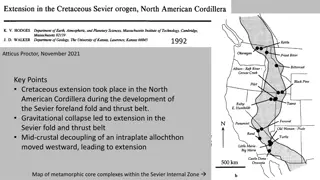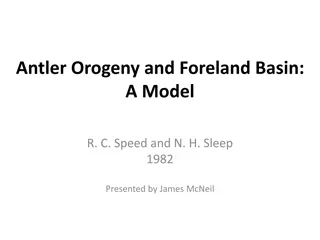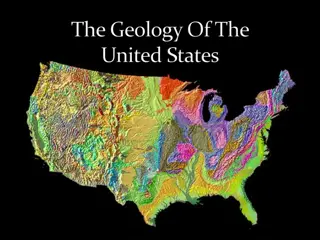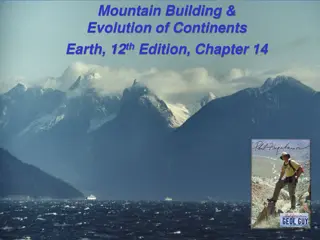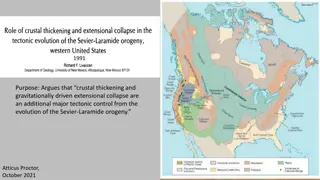Evolution of Sevier Orogeny and Cretaceous Extension in North American Cordillera
The Sevier Orogeny in the Cretaceous period led to extension in the North American Cordillera, with gravitational collapse playing a key role in the development of the Sevier fold and thrust belt. The internal zone consisted of metamorphic core complexes and Mesozoic-Paleogene plutons, showcasing ev
0 views • 5 slides
Antler Orogeny and Foreland Basin Model Overview
The Antler Orogeny, a Late Devonian to mid-Early Mississippian event, impacted the passive margin of the North American continent, particularly in Nevada and Idaho. The orogeny involved displacement of oceanic strata, subsidence of a foreland basin, and maintenance of highlands in the interior regio
1 views • 14 slides
The Geology of the United States: Overview of Major Provinces and Landforms
The geology of the United States is diverse and fascinating, organized into 10 key geologic provinces along with Hawaii and Alaska. Orogeny processes have shaped the land over time, adding new land to the Precambrian craton. Geologic maps depict the location and age of rocks in the uppermost crust u
0 views • 45 slides
Understanding Mountain Building and Evolution of Continents
Mountain building, orogeny, and the formation of major mountain belts are key processes in the evolution of continents. This chapter delves into the geological mechanisms behind these phenomena, focusing on convergent boundaries, the American Cordillera, Alpine-Himalaya chain, and other significant
0 views • 50 slides
Tectonic Controls of the Sevier-Laramide Orogeny
The Sevier-Laramide orogeny was influenced by crustal thickening and gravitational extensional collapse. The tectonic model proposed suggests that conductive heating from subduction weakened the crust, leading to compression, uplift, and lateral growth. Deformation persisted from the Cretaceous to t
0 views • 8 slides
